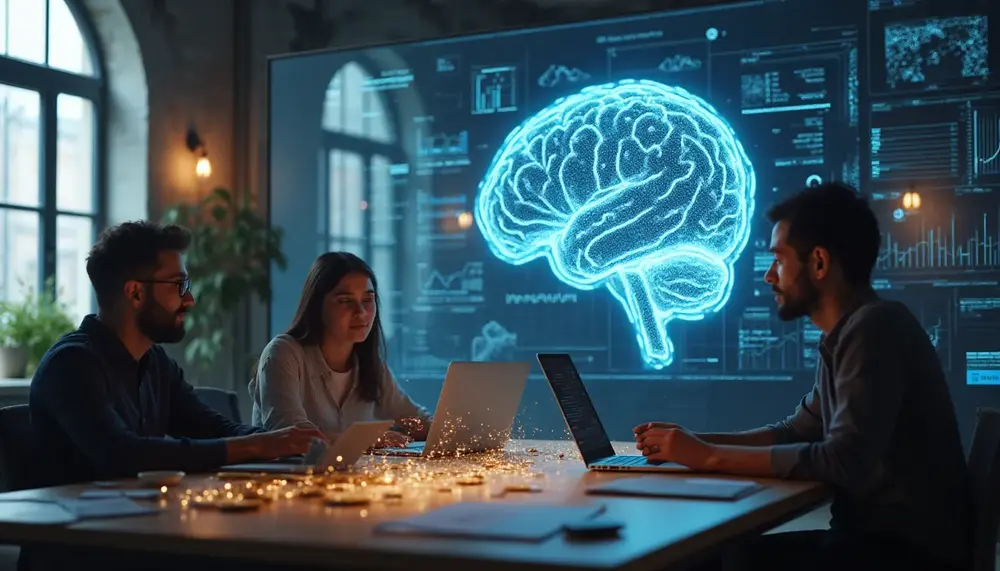Table of Contents:
Churches in the US Embrace AI and Cryptocurrency
A recent report by Pushpay, as covered by Business Insider, reveals a significant shift in how churches across the United States are integrating technology into their operations and missions. The 2025 State of Church Tech report surveyed over 1,700 church leaders from various denominations and budgets, highlighting a growing trend toward the adoption of artificial intelligence (AI) and cryptocurrency.
According to the report, 45% of respondents now use AI, marking an 80% increase from the previous year. Most church leaders utilize AI for communication tasks such as writing content, editing, and generating graphic designs, while 18% use it to develop sermons. Livestreaming has also become a staple, with nearly 90% of church leaders reporting that they live-stream worship services or events, a practice that gained momentum during and after the COVID-19 pandemic.
The report also notes a transformation in donation practices. Online giving is now the most popular digital solution among churches, with 70% of leaders believing that technology has increased generosity within their congregations. While only 10% of surveyed leaders currently accept cryptocurrency, 39% believe it will become strategically important in the next two to three years—a 44% increase from 2024. However, 62% of respondents admitted they "don't know" or "need to learn more" about the benefits of cryptocurrency.
Pushpay's chief product officer, Gruia Pitigoi-Aron, emphasized that the goal of leveraging technology is not to replace people but to amplify the church's mission and foster community. The use of QR codes is also on the rise, often directing community members and streaming viewers to next steps with a simple scan or tap. Over half of the surveyed church leaders reported increasing their tech budgets over the last two years.
"In our own day, the Church offers to everyone the treasury of her social teaching in response to another industrial revolution and to developments in the field of artificial intelligence that pose new challenges for the defence of human dignity, justice and labor," stated Pope Leo XIV during his first address to the College of Cardinals.
| Key Technology Adoption Metrics | Percentage |
|---|---|
| Churches using AI | 45% |
| Increase in AI use (year-over-year) | 80% |
| Churches live-streaming services | ~90% |
| Leaders accepting cryptocurrency | 10% |
| Leaders expecting crypto to be strategically important (next 2-3 years) | 39% |
| Leaders unsure about crypto benefits | 62% |
| Leaders who increased tech budgets (last 2 years) | >50% |
- AI is primarily used for communication and content creation.
- Livestreaming and online giving are now standard practices.
- Interest in cryptocurrency donations is rising, though knowledge gaps remain.
- Churches are increasing their investment in technology.
Summary: US churches are rapidly adopting AI and digital solutions, with a notable increase in tech budgets and a growing interest in cryptocurrency, as reported by Business Insider.
Pakistan Allocates 2,000 Megawatts for Crypto Mining and AI Data Centers
According to the Pakistan Observer, the federal government of Pakistan has made a landmark decision to allocate 2,000 megawatts of electricity for the development of crypto mining and AI data centers. This initiative is part of the first phase of the National Digital Infrastructure Project and aims to utilize surplus electricity for Bitcoin mining and advanced technologies.
The Pakistan Crypto Council will oversee the implementation of this project, which is designed to attract foreign investment and create job opportunities in the tech sector. The government is also introducing a digital system to modernize the economy, with electricity needs for Bitcoin mining and data centers being met on a priority basis. The integration of Bitcoin mining and AI technology is expected to enhance national security and strengthen national sovereignty.
In addition, the federal government has endorsed the establishment of the Pakistan Digital Assets Authority (PDAA), a dedicated body to regulate blockchain-based financial infrastructure. The Ministry of Finance has announced a comprehensive strategy to regulate digital assets, aiming for FATF-compliant innovation, economic inclusion, and responsible adoption of digital assets.
Finance Minister Muhammad Aurangzeb, who also serves as chairman of the Pakistan Crypto Council, stated that the PDAA will create a future-ready framework to protect consumers, invite global investment, and position Pakistan at the forefront of financial innovation. The PDAA will oversee licensing, compliance, and innovation within the digital asset ecosystem, regulating exchanges, custodians, wallets, tokenized platforms, stablecoins, and DeFi applications under a single framework.
This strategic move aligns Pakistan with other economies such as the UAE, Japan, Singapore, and Hong Kong, which have established digital asset regulators to foster innovation while ensuring compliance with global financial norms.
| Key Project Details | Value |
|---|---|
| Electricity allocated for crypto mining & AI data centers | 2,000 megawatts |
| Regulatory body established | Pakistan Digital Assets Authority (PDAA) |
| Primary aims | Attract foreign investment, create tech jobs, modernize economy |
| Compliance focus | FATF-compliant innovation, economic inclusion |
- Pakistan is prioritizing electricity supply for digital infrastructure projects.
- The PDAA will regulate all aspects of the digital asset ecosystem.
- The initiative is expected to boost national security and economic modernization.
- Pakistan is aligning its regulatory approach with leading global economies.
Summary: Pakistan has allocated 2,000 megawatts of electricity for crypto mining and AI data centers and established the PDAA to regulate digital assets, aiming to attract investment and modernize its economy, as reported by Pakistan Observer.
Sources:















